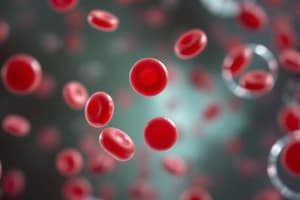Podcast
Questions and Answers
Which of the following drugs primarily inhibits ADP-mediated platelet aggregation?
Which of the following drugs primarily inhibits ADP-mediated platelet aggregation?
- Abciximab
- Aspirin
- Prasugrel (correct)
- Prostacyclin
What is the gold standard imaging technique for diagnosing pulmonary embolism?
What is the gold standard imaging technique for diagnosing pulmonary embolism?
- X-ray
- Angio-CT (correct)
- Ultrasound
- MRI
What is a common side effect of Ticlopidine, an older thienopyridine drug?
What is a common side effect of Ticlopidine, an older thienopyridine drug?
- Hypokalemia
- Anemia
- Neutropenia (correct)
- Hypertension
Which anticoagulant group acts directly on thrombin in the coagulation cascade?
Which anticoagulant group acts directly on thrombin in the coagulation cascade?
Which receptor does Abciximab primarily target in the process of inhibiting platelet aggregation?
Which receptor does Abciximab primarily target in the process of inhibiting platelet aggregation?
What is a common side effect of Gatranes?
What is a common side effect of Gatranes?
Which class of anticoagulants requires INR monitoring during treatment?
Which class of anticoagulants requires INR monitoring during treatment?
Which fibrinolytic drug is known for its antigenicity?
Which fibrinolytic drug is known for its antigenicity?
Which of the following conditions is a contraindication for using fibrinolytic drugs?
Which of the following conditions is a contraindication for using fibrinolytic drugs?
What therapeutic use is NOT indicated for fibrinolytic drugs?
What therapeutic use is NOT indicated for fibrinolytic drugs?
Which of the following anticoagulants does NOT require Antithrombin III for its effect?
Which of the following anticoagulants does NOT require Antithrombin III for its effect?
What is the therapeutic range for INR in patients treated with antagonists of vitamin K?
What is the therapeutic range for INR in patients treated with antagonists of vitamin K?
Which drug class does NOT generally require INR monitoring?
Which drug class does NOT generally require INR monitoring?
Flashcards are hidden until you start studying
Study Notes
### Drugs Affecting Blood
- Platelet aggregation is a key process in blood clotting.
- Platelet Aggregation Factors:
- TXA2
- ADP
- AVP
- v.Willebrandt factor
- Collagen
- Adrenergic system
- GP IIb/IIIa receptor ### Anticoagulants '
- ! Anticoagulants prevent blood clots from forming and growing.
- Anticoagulant Groups:
- Heparin
- Low molecular Heparins (LMH)
- Hirudin and synthetic analogues
- Polysaccharide group
- Antagonists of vitamin K
- NOAC (non-vitamin K antagonist oral anticoagulants):
- Gatranes
- Xabanes ### Drugs Affecting Coagulation Cascade
- Heparin interacts with ATIII (antithrombin III)
- Hirudin and heparinoids:
- Bivalirudin
- Lepirudin
- Effect without ATIII
- Low molecular Heparins:
- Enoxaparin
- Dalteparin
- Nadroparin
- Polysaccharide Group:
- Fondaparinux
- Idraparinux
- Antagonists of vitamin K:
- Warfarin (INR monitoring)
- Acenocumarol
- Gatranes:
- Xymelagatran (liver toxicity)
- Dabigatran
- Xabanes:
- Riwaroxaban
- Apiksaban
- Betriksaban
- Endoksaban ### Oral Anticoagulants
- Antagonists of Vitamin K
- Inhibit the synthesis of coagulation factors: II, VII, IX, X
- Requires Vitamin K for synthesis
- INR (International Normalized Ratio):
- Used to monitor treatment
- Therapeutic range is 2 - 3.5
- NOAC (Non-Vitamin K Antagonist Oral Anticoagulants):
- Gatranes
- Xabanes
- Well tolerated
- Reduced side effects
- No INR monitoring needed
Thrombolytic (Fibrinolitic) Drugs
- Thrombolytics dissolve clots to recanalize occluded blood vessels.
- Fibrinolytic drugs lyse clots in the blood by converting plasminogen to plasmin
- Fibrinolytic drugs:
- Anistreplase
- Streptokinase
- Urokinase
- Alteplase (tPA)
- Tenecteplase (TNK-tPA) ### Therapeutic Uses of Thrombolytics
- Acute ischemic stroke
- Acute myocardial infarction
- Acute pulmonary embolism
- Deep vein thrombosis
- Arterial thrombosis ### Contraindications for Thrombolytics
- Prior Intracranial Hemorrhage (ICH)
- Known cerebral vascular lesion
- Intracranial Malignant neoplasm
- Ischemic stroke within the past 3 months
- Aortic dissection
- Active bleeding
- Pregnancy
Ticlopidine
- The oldest drug from the thienopiridine group
- Side effects:
- Diarrhea
- Neutropenia
- Hyperlipaemia
Studying That Suits You
Use AI to generate personalized quizzes and flashcards to suit your learning preferences.




